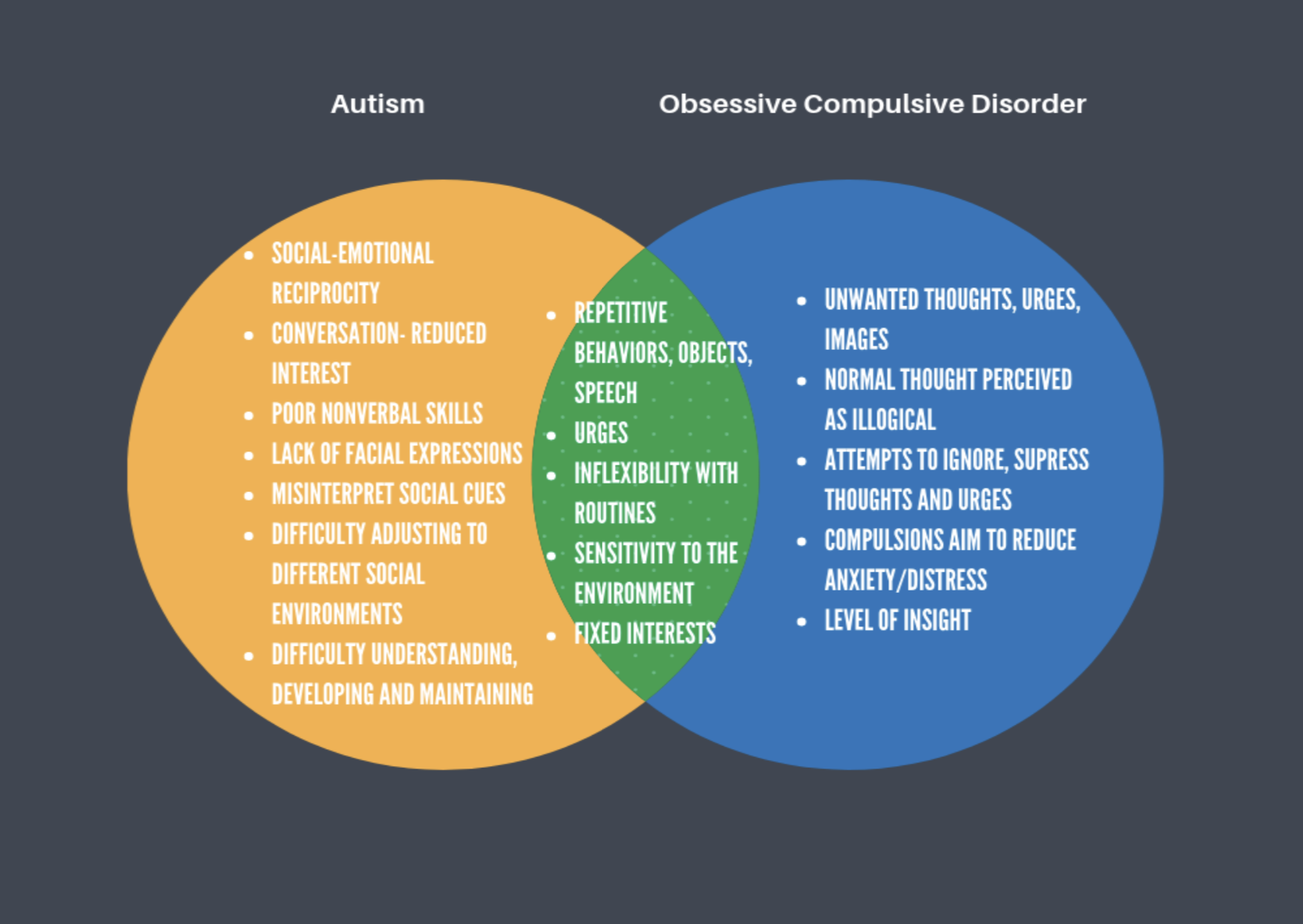Autism Spectrum Disorder (ASD) and OCD
It is tricky to differentiate between symptoms of Obsessive-Compulsive Disorder (OCD) and Autism Spectrum Disorder (ASD). In fact, there is a high comorbidity rate between the two disorders. Patients with OCD have a 13 times higher risk of having an ASD diagnosis, and a history of OCD quadruples the risk of one having ASD (Meier et al., 2015).
There are many overlapping symptoms in both ASD and OCD. For instance, it is common for someone with ASD and OCD to have both repetitive behaviors, repetitive speech, rigidity with routines, and sensitivity to the environment. These behaviors may look the same on the surface, so it is imperative to understand the function underlying each behavior. Is the repetitive behavior aimed at reducing anxiety to a certain fear or is the repetitive behavior an attempt to regulate overstimulation in an environment? Is being stuck attributed to doing a ritual just right or being engaged in an enjoyable task? Differential diagnosis is challenging!
Treatment:
Having an accurate diagnosis is imperative and the first step to starting treatment. ASD can be diagnosed by a neuropsychologist, with the ADOS-2 (Autism Diagnostic Observation Schedule- 2ndedition), OCD diagnosed with the YBOCS (Yale-Bown Obsessive Compulsive Scale), among other measures. Understanding an accurate diagnosis is helpful for a psychologist to develop a treatment plan and tailor it to the individual’s needs.
Exposure and response prevention (ERP) is an evidence-based treatment for OCD for those with ASD. As with any treatment, the patient’s willingness to participate is crucial. It may take longer to develop rapport between the patient and provider. It is also important to expect a longer treatment plan to allow for additional practice for exposures. Treatment can include behavioral strategies to treat overlapping ASD and OCD symptoms. Treatment should also include family involvement, increased use of visual aids, using concrete examples, short and clear instructions, and positive reinforcement (Kose et al., 2018).
Helpful Links:
https://iocdf.org/expert-opinions/expert-opinion-aspergers-and-ocd/
References:
Centers for Disease Control and Prevention. (2018). Prevalence of Autism Spectrum Disorder Among Children Aged 8 Years – Autism and Developmental Disabilities Monitoring Network, 11 Sites, United States, 2014. Morbidity and Mortality Weekly Report, 67(6). Retrieved from https://www.cdc.gov/mmwr/volumes/67/ss/pdfs/ss6706a1-H.pdf
Kose, L. K., Fox, L., & Storch, E. A. (2018). Effectiveness of cognitive-behavioral therapy for individuals with autism spectrum disorders and comorbid obsessive-compulsive disorder: A review of the research. Journal of developmental and physical disabilities, 30(1), 69-87.
Meier, S. M., Petersen, L., Schendel, D. E., Mattheisen, M., Mortensen, P. B., & Mors, O. (2015). Obsessive-Compulsive Disorder and Autism Spectrum Disorders: Longitudinal and Offspring Risk. PloS one, 10(11), e0141703. doi:10.1371/journal.pone.0141703\
Van Steensel, F., Bogels, S.M., and Perrin, S. (2011) Anxiety Disorders in Children and Adolescents with Autistic Spectrum Disorders: A Meta-Analysis. Clin Child Fam Psychol Rev, 14(3): 302–317.
DISCLAIMER: The content found here is intended to serve as educational content and is not intended to replace therapy. For treatment-related questions, please be sure to work with your local provider or contact a local clinician.
Videos: Autism Spectrum Disorder (ASD)
Choose a title below to view a video for more information on various OCD topics.
Jonathan Hoffman, Ph.D., ABPP, discusses how the presentation of Obsessive-Compulsive Disorder (OCD) may vary in those with Autism Spectrum Disorders (ASD).
For more information and resources on OCD please visit peaceofmind.com
Jonathan Hoffman, Ph.D., ABPP, discusses the research on the comorbidity on Autism Spectrum Disorders (ASD) and Obsessive-Compulsive Disorder (OCD) and how the rates vary.
For more OCD resources and information please visit peaceofmind.com
Jonathan Hoffman, Ph.D., ABPP, discusses why Obsessive-Compulsive Disorder (OCD) is often not treated in people with Autism Spectrum Disorders (ASD) until more recently.
For more information and resources on OCD please visit peaceofmind.com
Jonathan Hoffman, Ph.D., ABPP, discusses identifying the differences and the manifestations in anxiety due to Autism Spectrum Disorders (ASD) and anxiety due to Obsessive-Compulsive Disorder (OCD).
For more information and resources on OCD please visit peaceofmind.com
Jonathan Hoffman, Ph.D., ABPP, discusses the importance of finding providers that have experience in treating both Autism Spectrum Disorders (ASD) and Obsessive-Compulsive Disorders (OCD). When these disorders are treated effectively, individuals have the opportunity to reach their full potential.
For more OCD resources and information please visit peaceofmind.com
Jonathan Hoffman, Ph.D., ABPP, discusses how treatment for both Obsessive-Compulsive Disorder (OCD) and Autism Spectrum Disorders (ASD) are very similar and the differences in effectively treating both disorders versus the disorders individually.
For more information and resources on OCD please visit peaceofmind.com
Jonathan Hoffman, Ph.D., ABPP, discusses what treatment looks like for those with comorbid Autism Spectrum Disorders (ASD) and Obsessive-Compulsive Disorder (OCD).
For more information and resources on OCD please visit peaceofmind.com
Jonathan Hoffman, Ph.D., ABPP, discusses the different challenges that come with treating Obsessive-Compulsive Disorder (OCD) patients who also have a comorbid Autism Spectrum Disorders (ASD) diagnosis.
For more information and resources on OCD please visit peaceofmind.com
Jonathan Hoffman, Ph.D., ABPP, discusses how caregivers and loved ones can provide support to those with ASD and OCD.
For more information and resources on OCD please visit peaceofmind.com
This webinar will discuss the core features of OCD and Autism Spectrum Disorder, highlighting similarities and differences in symptoms. There will be a discussion of what information can be expected to share during an evaluation. A case example will be discussed to provide an example of how exposure and response prevention can be adapted for individuals with ASD.

